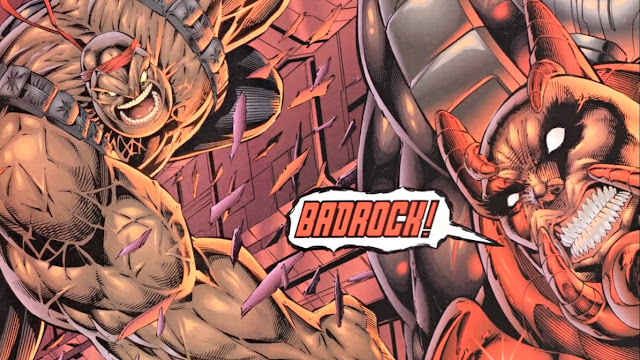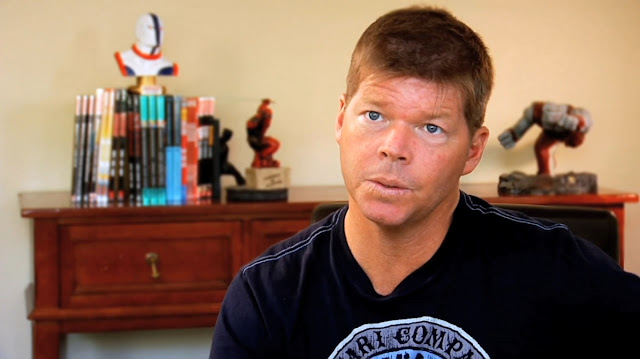
The Image Revolution looks at the founding of Image Comics in the early 90s. What was the comic book landscape at that time, and what caused the industry's biggest talents to jump ship from Marvel and create something on their own. From there, once it was founded, how did these guys who now had complete control over their output manage? There were breakout successes, bumps in the road, conflicts between the members, but ultimately these seven founders did something to change the comic book industry that still endures, as one of their newer talents, Robert Kirkman, proved in creating the hugely successful Walking Dead comic books.
This was pretty fantastic. It captures a moment in time when these guys were rock stars. As a comic book collector at that time, I was in it, but that was also 30 years ago, so I didn't remember it all, and also was too young to understand the ramifications of everything that was happening. The film also had the perspective of time, as these guys who were mostly in their late 20s/early 30s--and Liefeld was only 25--are now in their 50s; and we get a sense of everyone's distinct personalities, as opposed to seeing them all as one collective, which I think is important too. McFarlane never went back to the big guns like DC and Marvel, maintaining his independent roots throughout; while Jim Lee is now the Publisher and Chief Creative Officer at DC. With the current ecosystem where Marvel and DC rule with their movies, the reminder that it wasn't always that way, and that Image put a big hurt on them at one time, is a good one for us, especially as both Marvel and DC have only become more corporate since then.
I was 12 in 1991, and I used to blow my allowance every Sunday at the local flea market, haggling with guys in their 30s and 40s to try and make my $10 go as far as it could. I remembered when Todd McFarlane's Spider-man book first came out; then when Rob Liefeld's X-Force--which I had to buy five copies of to make sure I got one with each card--plus an extra so I could open it and read it; and then when Jim Lee's X-Men with its five covers that I had to buy all of, it was like these guys couldn't make anything bad. And then I started noticing they weren't drawing their books anymore. What happened? Were they off for a month? Extended hiatus? This was before the internet was widespread, and my parents didn't have the money for a computer back then, so it took some time before I found out in a Wizard magazine what had happened. What's interesting is, as I got older and into high school, I grew out of both the Marvel and DC books I'd read, and the Image ones I picked up, but I did remember before then that Image had the publication schedule problems they described here--when am I going to get the next Youngblood or Brigade? But then also there were other publishers out there like Valiant that were putting out great stuff. My $10 was stretched too thin, so I started spending my allowance on Taco Bell and Mortal Kombat on Friday night trips to the mall. What was cool about this documentary, was I could go back in my mind and see where I stepped off the train, but also follow where it went after I got off and get the rest of the story.
Other than Liefeld who was born in '67, and Jim Valentino who was born in '52, the rest of the Image guys were born between the late '50s and early '60s. I guess like the way I'm on the cusp of Gen-X and Millennial--an Xennial--these guys are also cuspers, Generation Jones, and when I look at it, this cohort is responsible for a lot of the cultural and entrepreneurial innovations I grew up with in the 90s. From a music standpoint, Michael Jackson, Prince, and Madonna all fall in this group; Quentin Tarantino does as well, which was a huge influence on how we view movies; and then you have these guys shaking up the comic book industry. I think this film did a great job in tapping into that creative energy. Before they formed Image, they were already blowing up all the standard comic book conventions that came before them. They were racier, more in your face, and as a kid at that time, I was eating it all up. I'd dig through old back issues from earlier times at the flea market, and while I liked a lot of what I saw, it wasn't punching me in the mouth the way Liefeld, Lee, McFarlane, et al were (and I name those three, because I read their stuff the most at that time. Marc Silvestri and Erik Larsen were a couple others I was big on.) The film makes the creation of Image almost an inevitability, as these guys were selling tons of books, yet getting no recognition from Marvel for it, so something had to give.
Out of all of them, Rob Liefeld was the one I read the most, and even though when he left Marvel Fabian Nicieza continued on writing for X-Force, it wasn't the same without Liefeld's illustrations. The documentary shows Liefeld's Levi's 501 jeans commercial, and I remembered that when it aired, saying "hey I know him!" I also wondered why he wasn't drawing Cable and Deadpool, not knowing how all of that worked with rights and licensing. The thing about Deadpool now, is he's on the level of a Spider-man, and for me it's cool to know that I saw when he first appeared and watched him grow to this stature. That's one thing I remembered about Liefeld's Image books, they were really good, but he had no one on the level of Cable or Deadpool in them. He said in a different interview that Marvel was guarded on how much they let other books have Spider-man and Wolverine in their issues, so he decided to just make his own in Cable and Deadpool. At the time I thought the problem was he couldn't create a new Cable and Deadpool for his Image books, but what this documentary shows is, Liefeld, at 25, was stretched too thin in trying to run his new company and get three books out at the same time--but there was also an underlying sense in his interviews for the documentary that he had a youthful impetuousness that made him think at that time that making another Cable and Deadpool would be a piece of cake, that he could make tons of them, when that ultimately wasn't the case. Still, like Jim Morrison after The Ed Sullivan Show said they couldn't go on again after he said "get much higher," and he said "yeah but we've already done The Ed Sullivan Show," Liefeld can say "I've already made Cable and Deadpool" too.
Going back to Liefeld, one of the best moments of the documentary is when he says "we killed Superman! We broke Batman's back!" referring to a desperate DC, having fallen behind Image in the early 90s, taking extreme measures to make themselves relevant again. They also talked about how speculators had moved from baseball cards to comics around that time, and I remember people who never collected comics buying that Death of Superman issue thinking they'd be rich in 20 years. I was 13 then, and not long for the comics book world--I was already so disillusioned with it that I didn't even bother with that Death of Superman thing. It seemed any possible milestone was a three hologram cover set at $5 a piece. Whether the bubble was going to burst with comic speculation or not, I was priced out before it happened, and never really came back--except for a blip in the early 2000s when I bought up some of the Deadpool comics. At the time, as only a 13-year-old, I didn't put two-and-two together and see that Image was forcing DC to kill Superman; but also, I think as a 13-year-old I didn't get how much Image influenced my understanding of the ownership of my creations years later. I remember a panel in an early Spawn issue where McFarlane depicts the arms of the major DC and Marvel characters reaching through prison bars, while his Spawn was completely free. When I wrote A Girl and a Gun, with the plot that my main character Justin was adapting comic books for TV, I decided to create my own comic book company, Aries Comics, and my own characters to go with it. I didn't realize where that impetus came from though until I watched this documentary, and saw that panel again. I think in a lot of ways my cusp Xennial cohort are the inheritors of the legacy of Generation Jones, and that's no more apparent than in the success of Robert Kirkland, who is about six months older than me--and like the founders of Image, it was only fitting that he was told by them that a comic book about zombies wouldn't work, only to prove them wrong.
Will from Exploding Helicopter often jokes that I tend to give MA theses when I'm breaking down films as a guest on his podcast, and this review is turning into one of those, so I probably should wrap this up. I think this film does a great job of capturing a moment in time and a movement toward independence, and whether you were there for the ride or not--or like me, got off the ride earlier on--this has a lot in it to enjoy. Right now you can get it on Tubi and Pluto, also Shout Factory on Prime. If you're watching it for free like that, it's definitely worth it.
For more info: https://www.imdb.com/title/tt2294916
And if you haven't yet, check out my new novel, A Girl and a Gun, at Amazon in paperback or Kindle!






No comments:
Post a Comment